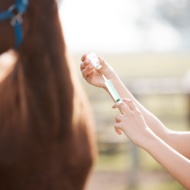It will investigate if AI could detect disease earlier.
Researchers from the University of Bristol have received funding to study how artificial intelligence (AI) might be used to detect disease in dairy cows earlier.
The project is one of 14 to receive a share of £9m funding from the Biotechnology and Biological Sciences Research Council (BBSRC) and the Department of Environment, Food and Rural Affairs (Defra), in a move to combat endemic livestock disease.
The project, led by Professor Andrew Dowsey from Bristol Veterinary School, will see a collaboration of University of Bristol researchers in veterinary medicine, animal behaviour, computer vision and AI.
The group will use AI to monitor the social interactions of cattle to identify indications of developing mastitis or lameness, which are two of the most significant diseases affecting the UK dairy industry.
These diseases compromise the health and welfare of dairy cows, which can lead to financial losses for farmers and the industry. Cows that suffer from disease have also been found to contribute a higher proportion of methane emissions, affecting sustainability in the sector.
The current technology used for disease detection in dairy cows tends to focus on observable symptoms that are associated with later stages of the disease.
Professor Dowsey and the research team will be investigating whether AI can monitor social interactions to identify diseases at an earlier stage.
Previous studies have recognised a correlation between cattle in the early stages of disease and reduced levels of social interaction. However, farmers are frequently too busy to closely monitor social interactions between their cows.
The AI developed by the research team is able to track the motion of cows, as well as recognising each cow by its distinctive coat pattern.
Once the AI has been trained to spot behaviour changes that indicate early-stage mastitis and lameness, it will be deployed to recruited farms for testing.
Professor Dowsey said: “We are excited to have been given the opportunity to fuse Bristol Veterinary School’s world-class expertise in animal behaviour with our recent developments in artificial intelligence for livestock monitoring.
“Detecting subtle changes in social behaviour could hold the key to the early diagnosis of disease in dairy cattle."
Image (C) Shutterstock



 Zoetis UK has apologised for a supply shortage of Equip Artervac, caused by a manufacturing issue.
Zoetis UK has apologised for a supply shortage of Equip Artervac, caused by a manufacturing issue.